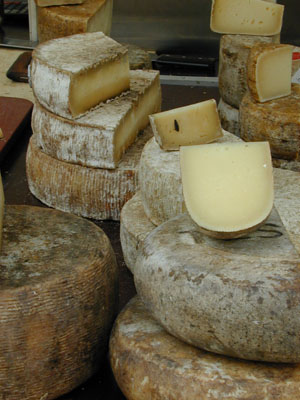cheese

Cheese for sale in a market.
Meanings
Noun
- A dairy product made from curdled or cultured milk.
- Any particular variety of cheese.
- A piece of cheese, especially one moulded into a large round shape during manufacture.
- A thick variety of jam (fruit preserve), as distinguished from a thinner variety (sometimes called jelly)
- A substance resembling cream cheese, such as lemon cheese
- That which is melodramatic, overly emotional, or cliché, i.e. cheesy.
- Money.
- In skittles, the roughly ovoid object that is thrown to knock down the skittles.
- A fastball.
- A dangerous mixture of black tar heroin and crushed Tylenol PM tablets. The resulting powder resembles grated cheese and is snorted.
- Smegma.
- Holed pattern of circuitry to decrease pattern density.
- A mass of pomace, or ground apples, pressed together in the shape of a cheese.
- The flat, circular, mucilaginous fruit of the dwarf mallow (Malva rotundifolia (species)) or marshmallow (Althaea officinalis).
- A low curtsey; so called on account of the cheese shape assumed by a woman's dress when she stoops after extending the skirts by a rapid gyration.
- Wealth, fame, excellence, importance.
- The correct thing, of excellent quality; the ticket.
Verb
- To prepare curds for making cheese.
- To make holes in a pattern of circuitry to decrease pattern density.
- To smile excessively, as for a camera.
- To stop; to refrain from.
- To anger or irritate someone, usually in combination with "off".
- To use an unsporting tactic; to repeatedly use an attack which is overpowered or difficult to counter.
- To use an unconventional, all-in strategy to take one's opponent by surprise early in the game (especially for real-time strategy games).
Related
Similar words
Origin
- From Middle English chese, from Old English ċīese, specifically the Anglian form ċēse, from Proto-West Germanic *kāsī, borrowed from Latin cāseus. queso.
- Though commonly claimed to be a borrowing of Persian چیز, the term does not occur earliest in Anglo-Indian sources, but instead is "well recorded in British and Australian sources from the 1840s onwards".
- Etymology unknown. Possibly an alteration of cease.
- From cheesy.
Modern English dictionary
Explore and search massive catalog of over 900,000 word meanings.
Word of the Day
Get a curated memorable word every day.
Challenge yourself
Level up your vocabulary by setting personal goals.
And much more
Try out Vedaist now.

